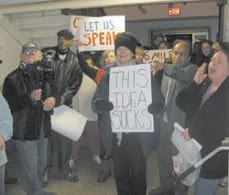Recently Homeless Don't Fit Classic Sterotype
by Stephanie Sy
ABC News
June 20, 2009
On a busy street in Charlotte, N.C., a clean-cut woman stood on the sidewalk wearing a handwritten sign: "MOTHER OF THREE -- LOST MY JOB, ABOUT TO BE EVICTED, PLEASE HELP ME."
She said she was from the neighboring city of Kannapolis and didn't want to give her name out of fear her children would find out that she is begging on the street. She'd lost her job as a store clerk and blames the economy for not being able to find a new job. Panhandling was the only way to pay her rent, she said.
The woman is an extreme case of a growing trend -- Americans who find themselves on the brink of homelessness after losing their jobs. The National Alliance to End Homelessness estimates that, because of the recession, as many as a million additional Americans may become homeless in the next two years.
For lower-income working families, it means one poor decision can rapidly deteriorate into a maelstrom of debt and financial problems.
Many of the newly homeless do not fit the stereotype of homelessness. They may be hard-working, healthy and addiction-free.
The Jurado family has been technically homeless for six months. Pat Jurado and her husband, who preferred to remain anonymous, are supporting two sons, ages 2 and 5.
Even with dual incomes, with both spouses making about $16 an hour, the Jurados struggled to pay the bills in Paterson, N.J.
"He was working eight hours, I was working eight hours a day, but it still wasn't enough," said Jurado. "I felt like I needed a change."
Noticing more experienced co-workers getting laid off and thinking she could be next, Pat Jurado decided to move the family to Charlotte, N.C., where she thought she had lined up a higher paying job in accounts receivable and payable. She also expected the cost of living to be less in North Carolina.
But once the Jurados got to Charlotte, the position had been filled. With no savings and no home, the Jurados were forced to move in with a relative. Ten people crowded into a three-bedroom apartment.
More and more families are economizing by doubling-up in a single home, but for the Jurados, it was an unmanageable situation.
"It was chaos," said Pat Jurado. "We were literally on top of each other. We had a lot of bumping heads."
Depending on Public Assistance for the First Time
The Jurados were saved from having to go to a shelter by the local charity A Child's Place. The organization works with many of the 3,000 children in Charlotte-Mecklenberg public schools who are homeless and helps their families obtain everything from housing to health insurance.
The Jurados were given a two-bedroom apartment for six months rent-free.
"Sometimes folks just need a ... period where they can get back on their feet, where they can save some money for a [rent] deposit," said Annabelle Suddreth, the organization's executive director.
Jurado said she's never had to depend on charity or public assistance.
"I've been working since I was 19, and I'm 33 now. This is the first time that I haven't worked for six months," she said. "I don't want to be in this place. ... This is not one of my dreams."
Suddreth said many of the families her organization works with are not to blame for their financial plight.
"Whether it was an illness, the loss of a job, trusting in a subprime mortage loan that went wrong ... so many times a lot of these folks are just a victim of circumstance," said Suddreth.
A Child's Place has made the Jurados one of the more fortunate families. Across the country, homeless shelters are overflowing, tent cities are cropping up on the West Coast, and people are living in cars.
When given an assignment to draw a picture of his home, one child in Charlotte asked a volunteer whether he could draw the parking lot where his mother parked the family van every night.
Homeless Numbers Increasing
The effects of homelessness on children can be devastating. They may be twice as likely to get sick, fall behind two or three grade levels, and face mental and emotional problems.
"The numbers are increasing because of the economic challenge," said Suddreth. "The needs are growing. Where we once used to focus on what the child needs to be successful in school, now we're looking at basic needs like food."
Many of the nation's new homeless are also cropping up in pay-by-week motels.
Adrienne Carothers makes about $12 an hour as a teacher's assistant. You would never suspect she is homeless, but she has been living in a cramped motel room since March.
A single mother with three grown children, Carothers has always struggled to support the family. The final straw was when she recently sunk a month's pay into fixing up a rental that, she said, she was later unfairly evicted from.
With nothing left for another security deposit, she moved into a motel. Carothers said the wait list for public housing is too long.
To make matters worse, she recently was told she might not have a job next school year.
Carothers has gotten a part-time job for the summer at the YMCA that pays $8 an hour, not nearly enough to pay for the motel.
When asked what she'd do next, she could only say, "I'm not sure. Do I worry about it? Yeah, I worry about it every day. ... I break down and have to cry sometimes, because I don't see a way out."
Copyright © 2009 ABC News Internet Ventures
Subscribe to:
Post Comments (Atom)




No comments:
Post a Comment